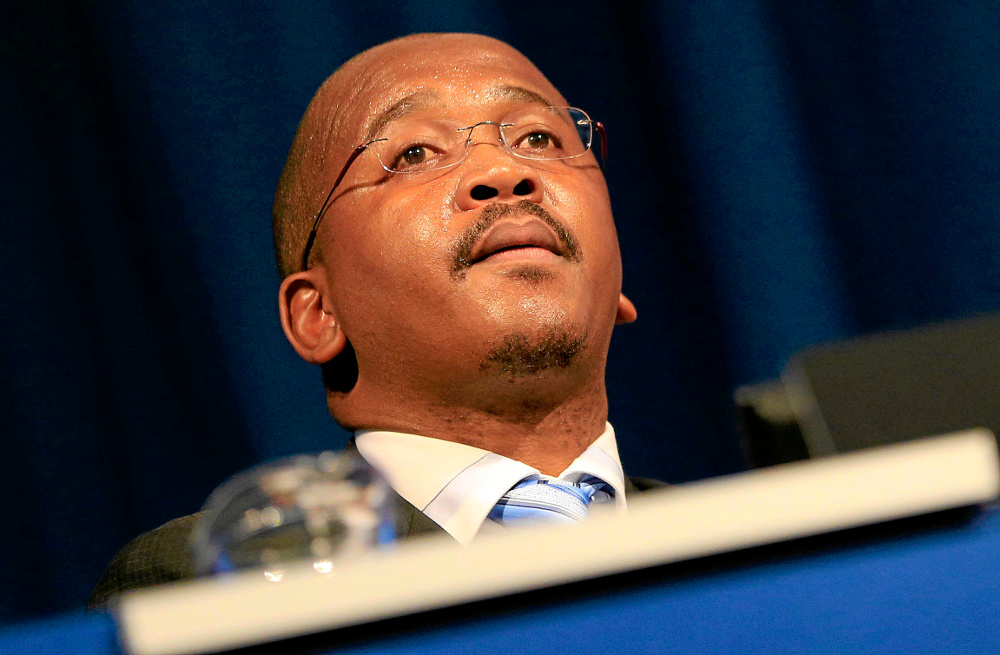Bismark Tyobeka
The embattled South African Nuclear Energy Corporation (Necsa) has hired the wife of the chief executive of the National Nuclear Regulator, which polices Necsa’s compliance with stringent safety regulations.
Ngeniswa Tyobeka’s appointment is just one example of a position that “did not exist on the approved Necsa organisational structure”, a Necsa whistle-blower says. It was “unbudgeted and unfunded, which translates into [an] irregular appointment and unauthorised expenditure”.
Both Necsa and the regulator are earmarked to play key roles in the imminent R1-trillion nuclear build programme, the biggest known procurement in South Africa’s history.
The latest allegation of jobs-for-friends among a tightknit clique of government nuclear mandarins raises concerns about decision-makers’ ability to run a process that is in South Africa’s best interests.
Ngeniswa’s appointment as a human resources officer at Necsa places her husband, Bismark Tyobeka, the nuclear regulator’s chief executive, in a difficult position.
It could cloud his judgment when he makes decisions regarding Necsa, from which his wife reportedly draws a R490 000 annual salary.
Ngeniswa was appointed to Necsa last year; her husband has been the head of the regulator since 2013.
The whistle-blower said this week the company’s parlous financial situation, with an apparent shortfall of R82-million this month, is partly a consequence of a “growing salary bill” caused by “unbudgeted and unfunded created [job] vacancies”.

Ngeniswa Tyobeka is married to the chief executive of the nuclear regulator.
Necsa said the whistle-blower’s figures were “speculative and simply incorrect”. It said it was “aligning the organisational structure with the strategy approved by the board, [which] has entailed the alignment of existing departmental structures, moving functions around, as well as the creation of new positions”, and that “they have been funded from existing resources”.
Necsa is in turmoil, with its board and chief executive facing off over allegations of irregular expenditure and mismanagement.
AmaBhungane reported that Energy Minister Tina Joemat-Pettersson reversed her earlier endorsement of the board’s intention to discipline Necsa’s chief executive, Phumzile Tshelane, for alleged breaches of good governance. Instead, she told the board to focus on the company’s “strategic direction” and a task team she had appointed would investigate “the affairs of the board”.
Its case against Tshelane involves two allegations – making unauthorised payments to, among others, the ANC without board approval, and appointing senior executives to his management team and Necsa subsidiaries without authorisation.
The whistle-blower wants the task team to “provide opportunities for Necsa employees to make confidential and protected disclosures” to it.
The whistleblower alleged that Necsa divisional executives are “restructuring their divisions with the primary objective to create new … posts, which are normally [then] filled by cronies”.
Ngeniswa’s appointment in the human resources department places her in the corporate services division of the company.
Necsa’s corporate services divisional executive is Xolisa Mabhongo, whose appointment is one of four divisional executive appointments that have been challenged in court for allegedly being irregular.
He is a career diplomat who was South Africa’s ambassador to Vienna and its permanent representative to the International Atomic Energy Agency (IAEA) between 2010 and 2014.
Ngeniswa’s LinkedIn profile reveals that she worked in the Vienna embassy as a “human resources and admin co-ordinator” from mid-2011, meaning that Mabhongo was her boss for at least two years.
Her husband was also based in Vienna, as head of an IAEA nuclear unit, between 2008 and 2013, which overlapped with Mabhongo’s term.
The whistle-blower claimed that Mabhongo and the Tyobekas were “very close friends” in Vienna.
Bismark dismissed these facts and claims as “an unfortunate fishing expedition which I am not prepared to entertain”.

Xolisa Mabhongo and the Tyobekas are allegedly friends.
Mabhongo said it was government policy to fill embassy vacancies with expatriate South Africans.
Necsa said Ngeniswa “applied for positions at Necsa long before the arrival of Mabhongo … By the time he joined Necsa, her appointment was already at a very advanced stage with interviews and panel discussions concluded”. It said she was interviewed twice in November 2013 for other positions, and again in February 2014 for the position she filled in June. It said Mabhongo started at Necsa in March 2014.
The timing suggests that although Ngeniswa Tyobeka had been interviewing for positions at Necsa for several months, her eventual appointment was confirmed only after Mabhongo’s arrival.
Necsa said, although three months had lapsed between her interview and starting work, “there is nothing unusual … as recruitment processes do take that long”.
Bismark and Necsa said Ngeniswa had a right to choose where she worked. “We are not aware of a ruling that family members of regulator personnel should not work in any of its regulated entities,” Necsa said.
Bismark also asked how his wife’s position could compromise nuclear safety regulation, although he admitted potential conflict had crossed his mind: “When she expressed her interest in a position that was advertised at Necsa … I first had to satisfy myself that this would not create a conflict along the working lines … Upon coming to a conclusion that the nature of the role would not constitute any conflict, I gave her my blessings.”
Ngeniswa declined to comment.
What would you do if you had skin in the game?
The primary role of the National Nuclear Regulator (NNR), its website says, is to monitor and enforce regulatory safety and prevent nuclear accidents.
The facilities it regulates include the Necsa research and production reactors at Pelindaba, and the Necsa-managed Vaalputs radioactive waste disposal facility in the Northern Cape. The Safari-1 reactor produces medical radioisotopes, used in the diagnosis and treatment of cancer, and is Necsa’s primary revenue earner.
How might a decision by the regulator, headed by Bismark Tyobeka, affect his wife, a Necsa human resources officer?
Imagine the Safari-1 reactor develops a problem. The NNR is called in, as the law dictates and, after an assessment, its chief executive faces a tough decision.
Close the reactor for an indefinite period, until all safety concerns have been addressed? Or risk putting its primary revenue earner out of action indefinitely, potentially plunging Necsa into a financial crisis that could lead to salary and job cuts (including, possibly, your wife’s)? This is not an entirely imaginary scenario.
According to Necsa’s 2013-2014 annual report, its isotope-producing company was forced by the regulator into a “prolonged closure”, understood to be 12 months, after an unspecified malfunction at its production facility. The annual report noted a 30% drop in sales over the financial reporting period.
Necsa sources claim that the company’s balance sheet is still reeling from this blow, and that Necsa might not be able to pay staff salaries, creditors or the regulator.
The regulator’s own financial stability depends, in part, on the receipt of licence fees from institutions such as Necsa.
* Got a tip-off for us about this story? Click here.
 The M&G Centre for Investigative Journalism (amaBhungane) produced this story. All views are ours. See www.amabhungane.co.za for our stories, activities and funding sources.
The M&G Centre for Investigative Journalism (amaBhungane) produced this story. All views are ours. See www.amabhungane.co.za for our stories, activities and funding sources.